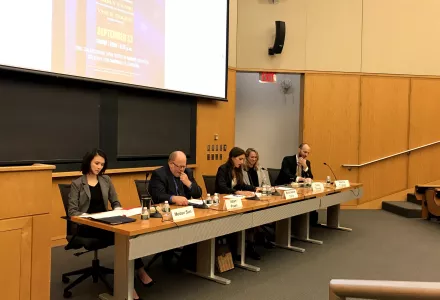
The rise of China is revealing increasing value clashes between the US and Europe.
In an event co-hosted by the Project on Europe and the Transatlantic Relationship (PETR) and the Asia Center, expert panelists discussed how the rise of China and issues around technology, trade and defense are dividing the transatlantic alliance on September 13th, 2019.
In the first of a new series of discussions on the impact of China’s rise in the international system and the effects on the integrity of the transatlantic relationship, Maria Adele Carrai, KU Leuven/Harvard University, Adam S. Posen, President, Peterson Institute (PIIE), Meicen Sun, Massachusetts Institute of Technology, Torrey Taussig, Research Director, Transatlantic Relations 2021, Harvard University / Brookings Institute and Vasilis Trigkas, Tsinghua University discussed how the emerging division between the United States and the European Union on China is playing out in trade, defense and economic policy.
Given the dominance of the dollar as the global reserve currency and inherent, structural weaknesses of the Renminbi, Adam Posen expressed little concern for its future. He noted that the US role to employ unilateral sanctions as a tool would help to cement this dominance.
“When I think of the US-EU-Asia triangle, the Bermuda Triangle comes to my mind. I predict stormy weather ahead,” Vassilis Trigkas noted. Europe would not follow the US’ military efforts in Asia because it still lacked a clear view of strategic interests in the region. At the same time, economic and trade ties, for example between Germany and China, were now stronger than ever, and of larger economic value than the US-Germany trade relationship. To reinvigorate the transatlantic relationship in relation to China, it would need political leadership that rivaled the capacity of President Kennedy – visionary leadership that could capture the imagination of the political sphere in Europe.
Although the transatlantic relationship retained its function as a key structuring element of geopolitics, the underlying values had become brittle, fueling a climate of competition and populism. The tenuous US-China relationship was playing out against this backdrop. The competition between these two global powers will impact the future other countries in Asia-Pacific as they decide on their main trading partners. For this reason, the development of other Asian countries will need to be followed carefully.
Reflecting on the impact of the triangular relationship with respect to technology, Meicen Sun noted how different, existing norms were shaping the relationships between the three countries and exposed the existing differences in values between the US and Europe. The US and the EU’s “digital war” made clear to what degree the definition of ‘freedom’ was different across the Atlantic (e.g. varying concepts of freedom of speech, or clashes between freedom of doing what one wants vs freedom of being protected and safe). Privacy concerns were far less critical for Chinese companies than cost-effectiveness in the delivery of IT technology. “It’s something that most Asian countries simply cannot afford.”
This event was the first in a new series entitled “China’s Rise and the Future of the Transatlantic Relationship.” Future events are planned in November and December 2019.
Link of the audio recording:
https://drive.google.com/file/d/1z0J8c_Ua9Gt_A0D_Ux8U4Px8yJp0DAyo/view?usp=sharing
Link to Maria Adele Carrai's page (organizer and moderator of the event):
https://asiacenter.harvard.edu/people/adele-carrai-maria-1396
Lecomte, Carole. “The Transatlantic Alliance in an Increasingly Non “Atlantic” World.” November 7, 2019






